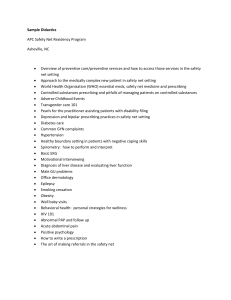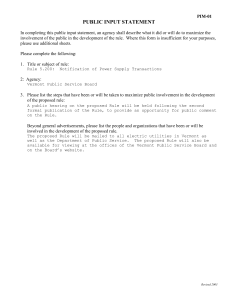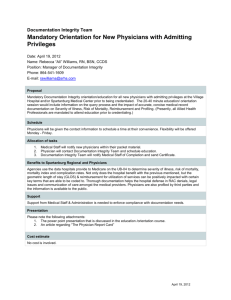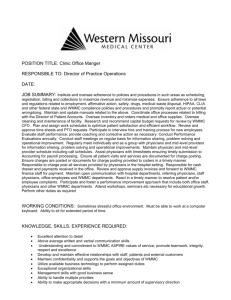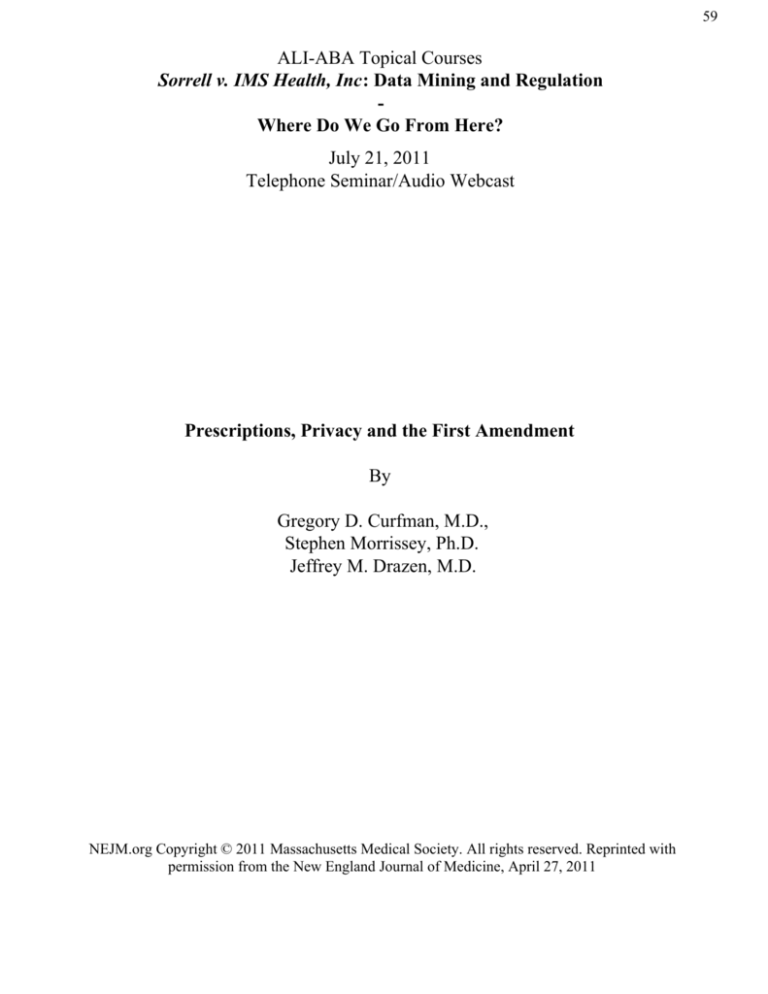
59
ALI-ABA Topical Courses
Sorrell v. IMS Health, Inc: Data Mining and Regulation
Where Do We Go From Here?
July 21, 2011
Telephone Seminar/Audio Webcast
Prescriptions, Privacy and the First Amendment
By
Gregory D. Curfman, M.D.,
Stephen Morrissey, Ph.D.
Jeffrey M. Drazen, M.D.
NEJM.org Copyright © 2011 Massachusetts Medical Society. All rights reserved. Reprinted with
permission from the New England Journal of Medicine, April 27, 2011
60
Prescriptions, Privacy, and the First
Amendment
Gregory D. Curfman, M.D., Stephen Morrissey, Ph.D., and Jeffrey M. Drazen, M.D.
N Engl J Med 2011; 364:2053-2055
On April 26, the Supreme Court heard oral arguments in a case that, when it is decided this spring,
will have important repercussions for the practice of medicine. At issue in William H. Sorrell,
Attorney General of Vermont, et al., Petitioners v. IMS Health Inc., et al.1 is whether detailed
information about prescriptions written by doctors, with the doctor identified, can be bought and
sold. Currently, this practice is legal in almost every state, and the outcome of Sorrell v. IMS
Health will signal whether states may restrict it.2
This is the way it works: Retail pharmacies retain information about all drug prescriptions that
they fill, including the patient's name, the identification of the prescriber, the name, dosage, and
quantity of the prescribed drug, and the date the prescription was filled. This information is
collected, along with the patient's age, sex, and drug history, and sold, with the individual
prescribing doctors identified but the patient's names encrypted, to data-mining companies (IMS
Health is one such company). The data-mining companies then further process the information by
collating each physician's prescribing history for each patient, and they sell it to pharmaceutical
companies. The prescribing information of individual doctors can be linked to the Physician
Masterfile of the American Medical Association (AMA), thereby enriching the data on prescribing
physicians (the Masterfile, which is sold by the AMA, includes information on every physician's
education, licensure, certification, hospital privileges, and practice details). The companies'
marketing departments use the information to develop strategies to sell drugs to individual
doctors, and the schemes are applied by pharmaceutical sales representatives (“detailers”) to make
pitches to the doctors in their offices. These solicitations are not intended to communicate
evidence-based information to doctors; they are intended to sell expensive drugs.3
It is a very successful business. When drug detailers have the prescribing history of the physicians
they are visiting, they sell more drugs. This is one of the principal reasons why the Pharmaceutical
Research and Manufacturers of America (PhRMA), the trade organization of the pharmaceutical
industry, joined the data miners as a party to the lawsuit. It is quite clear who profits from the sale
of the prescribing information: retail pharmacies, data-mining companies, drug companies, and the
AMA. In the end, the costs are passed along to patients, and physicians' prescribing practices are
manipulated by drug salespeople who know the details of their interactions with their patients.
Because of the concerns that many physicians have about the sale of their personal prescribing
information, the AMA developed the Physician Data Restriction Program, which allows
physicians to opt out of the use of their prescribing data by drug company salespeople (although
doctors cannot opt out of the sale of the data to the drug companies themselves). However, the
program seems to be minimally effective; data from the AMA itself indicate that less than 3% of
prescribing physicians have elected to opt out through this program. According to the Electronic
Privacy Information Center, this low opt-out rate may be due to the fact that the program is not
well known,4 especially to the more than 80% of physicians who are not AMA members, but
whose data are nonetheless sold by the AMA. (Physicians can register for the program on its Web
site.5)
After receiving complaints from the Vermont Medical Society about data mining, the Vermont
state legislature passed the Prescription Confidentiality Law, which required that data-mining
61
companies obtain explicit permission from a physician before selling his or her prescriberidentifiable information to pharmaceutical companies for the commercial purpose of drug
promotion (an “opt-in” requirement). However, the law permitted limited uses of the information
for medical care, insurance payment, law enforcement, public health, and scientific research
without obtaining physicians' approval, just as HIPAA (the Health Insurance Portability and
Accountability Act) does. The new law was thus narrowly tailored to achieve reasonable
regulation in line with a compelling interest of the state of Vermont.
The constitutionality of the Prescription Confidentiality Law was challenged in a suit brought by
leading data-mining companies, including IMS Health, and by PhRMA. Although the U.S. District
Court ruled in favor of Vermont, this decision was overturned by the U.S. Court of Appeals for the
Second Circuit and the law was struck down. Previously, similar data-mining laws in New
Hampshire and Maine had been upheld by the U.S. Court of Appeals for the First Circuit. Owing
in part to these conflicting rulings on similar laws, the Supreme Court agreed to hear the Vermont
case.
At issue in this important case is the conflict between the privacy of physician-identified drugprescribing information and the First Amendment right of a business to communicate about its
products (“commercial speech”). In contrast to public discourse, which is protected by the First
Amendment as a fundamental part of the democratic process, protection of commercial speech
under the First Amendment is a relatively recent development in the law.6,7 According to the
Supreme Court, government regulation of commercial speech must directly promote a substantial
governmental interest and must be no more extensive than necessary to meet that interest.8
Regulation of commercial speech was recently discussed in the Journal by Robert Post, now the
dean of Yale Law School, in relation to the New Hampshire version of the statute restricting the
sale of physicians' prescribing histories.7 Post agreed with the First Circuit that the New
Hampshire statute was constitutional, but a divided panel of the Second Circuit came to the
opposite conclusion about the constitutionality of the Vermont law.
In Sorrell v. IMS Health, we have sided with the state of Vermont, and we have filed a friend-ofthe-court brief supporting the appropriateness of the statute to protect the privacy rights of
physicians and patients.9 We do not believe that the organizations challenging the Prescription
Confidentiality Law are engaging in speech that warrants First Amendment protection. Rather,
they are selling highly sensitive medical information as a mere commodity without consent. We
are concerned that such selling of prescribing data to pharmaceutical companies results in the
manipulation of physicians' drug-prescribing practices, unwarranted intrusion into the privacy of
the doctor-patient relationship, and an increase in costs at a time when our health care system is
under unprecedented financial strain. Furthermore, the technique used to de-identify patient
information is flawed (and is often performed with the use of software provided by the datamining companies themselves), and the risk of re-identification poses a serious threat to the
confidentiality of patient information.3,10 A patient's drug history provides clear insight into that
patient's medical history. Therefore, we believe a finding by the Supreme Court overturning the
action of the Vermont legislature in this case would have serious negative consequences for the
practice of medicine and for the public health. Such a finding could also open the door to legal
challenges to other reasonable restrictions on the marketing practices of pharmaceutical
companies, including the current prohibition of the promotion of off-label uses of prescription
drugs.11
As medical journal editors committed to the open communication of medical knowledge, we are
strong proponents of First Amendment protection for speakers who attempt to communicate
important evidence-based health information or advocate for patients' and physicians' rights. But,
the doctor–patient relationship is a sacred trust, and the sale of physicians' confidential prescribing
information puts patients' highly private medical information at risk. Why should this information
be sold to data-mining and drug companies as a commodity, when it offers no benefit to patients
62
and their physicians? This undesirable practice is nothing more than commercial conduct — not
speech — and it is not in the best interest of the health of the American people.
Disclosure forms provided by the authors are available with the full text of this article at
NEJM.org.
This article (10.1056/NEJMe1104460) was published on April 27, 2011, at NEJM.org.
NEJM.org Copyright © 2011 Massachusetts Medical Society. All rights reserved.
References
1.
William Sorrell, as Attorney General of the State of Vermont; Jim Douglas, in his capacity
as Governor of the State of Vermont; and Robert Hofmann, in his capacity as Secretary of
the Agency of Human Services of the State of Vermont: Petition for a Writ of Certiorari.
December 13, 2010.
(http://www.americanbar.org/content/dam/aba/publishing/previewbriefs/Other_Brief_Upd
ates/10-779_Petitioner.authcheckdam.pdf.)
2.
Orentlicher D. Prescription data mining and the protection of patients' interests. J Law
Med Ethics 2010;38:74-84
CrossRef | Web of Science | Medline
3.
Steinbrook R. For sale: physicians' prescribing data. N Engl J Med 2006;354:2745-2747
Full Text | Web of Science | Medline
4.
Brief of amici curiae Electronic Privacy Information Center (EPIC) and 16 legal scholars
and technical experts in support of the petitioners.
(http://epic.org/privacy/chicago/epic_amicus.pdf.)
5.
Physician Data Restriction Program. (http://www.ama-assn.org/ama/pub/aboutama/physician-data-resources/ama-database-licensing/amas-physician-data-restrictionprogram.page?.)
6.
Va. State Board of Pharmacy v. Va. Citizens Consumer Council, 425 U.S. 748 (1976).
63
7.
Post R. Prescribing records and the First Amendment -- New Hampshire's data-mining
statute. N Engl J Med 2009;360:745-747
Full Text | Web of Science | Medline
8.
Central Hudson Gas & Electric Corp. v. Public Service Comm'n of N.Y., 447 U.S. 557
(1980).
9.
Brief amici curiae of the New England Journal of Medicine, the Massachusetts Medical
Society, the National Physicians Alliance, and the American Medical Students Association
in support of petitioners. (http://ssrn.com/abstract=1770524.)
10.
Ohm P. Broken promises of privacy: Responding to the surprising failure of
anonymization. UCLA Law Rev 2010;57:1701-1777
Web of Science
11.
Kesselheim AS, Avorn J. Pharmaceutical promotion to physicians and First Amendment
rights. N Engl J Med 2008;358:1727-1732
Full Text | Web of Science | Medline
64
2



